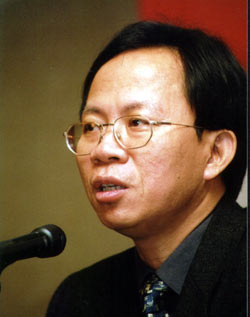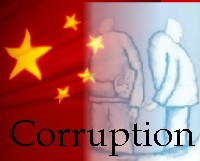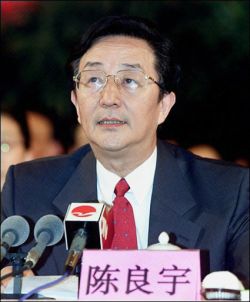Popular Elections Make U.S. Cities Less Corrupt ... !
Are American cities good role models for municipalities in China's one-party heartland? According to this op-ed article from China's state-controlled Oriental Morning Post, American cities use something called 'elections' to choose officials that are then beholden to the voters. It points out that because of this, government officials try to 'satisfy' the people. What a novel approach!
By Wu Qi-xun
Translated By Haywood Ho
October 13, 2006
China - Oriental Morning Post - Original Article (Chinese) 
 The knives are out for corrupt officials in China. In
The knives are out for corrupt officials in China. In
one of that nation's recurring such drives, which
are called to avoid true pluralism and government
oversight,
allies of President Hu's predecessor
Jiang Zemin are the principal targets. One such
person is former Commissioner of the National
Bureau of Statistics, Qiu Xiaohua. (above).
 Shanghai's Communist Party Secretary Chen
Shanghai's Communist Party Secretary Chen
Liangyu. He is the highest-ranking official oustered
in this
latest anti-corruption drive, and was a close
allie to former president Jiang Zemin. (below).
 -------------------------------------------------------
-------------------------------------------------------
Recently, the author attended an international urban development
conference that was attended by mayors from America, Japan, Mongolia, India and
other countries. The mayors had come together to accomplish a great task: to
discuss the development of small- and medium-sized cities in the 21st century, as
well as the prospects for development of their respective cities. I noted that of
all the small and medium-sized cities overseas, the smallest contained only 1500 inhabitants,
and covered an area of only one square kilometer. Many of America's towns have
between 50,000 and 100,000 people. In China, this would be considered a street
or a neighborhood, but overseas, these are cities. The hallmark of an American
city is that each has its own clearly defined border, its own laws and
regulations, a municipal government, newspapers and police departments.
But the most interesting thing of all is that many officials from
these smaller cities are part timers. In other words, even if they are mayors or
city council members, they have other jobs, and hold meetings of the city
council at night or on weekends, and for which they are not paid. At most they
are reimbursed for their traveling expenses. Examples of this include
California's Monterey Park and San Marino.
In China, these overseas mayors are held in very high regard. But
if you chat to them about certain aspects of city policy-making, even minor
matters such as the establishment of sister-city relations, these mayors are unable
to decide on such issues independently. They might offer verbal assurances, but
they are unable to close the deal, because such matters must be decided by all
of the people's elected representatives, or even the city's actual residents. City
officials in the United States owe their positions to the common people, and they
know that if their tenure in office is to continue, they must satisfy the
average person, and they therefore dare not lower their guard.
Then how do American cities make important decisions concerning urban
development, construction, road-building or Social Security funding?
First of all, in American cities during the early stages of
construction, legal experts using state and federal law as a reference point, draw
up detailed plans regarding areas to be zoned for example, for commercial use,
or as residential or for entertainment. Decisions about these zones are made at
a very early stage in the process, and usually reflect the previous zoning of
the city. The process is similar to a huge chess game for the mayor and city
council members: the ground rules have been decided upon, and now the pieces must
be moved across the board as the rules prescribe.
Secondly, some American cities might not have a police station,
may not have a fire department or even have a business or manufacturing department.
But one thing they all have is a bureau of city planning. This is a group made
up of professionals that will help guide the decision-making in regard to land
development, zoning and other city planning. Everything from rebuilding part of
town to adding a toilet or new bedroom to a resident's backyard must all be
approved by this bureau, which may even send inspectors to the site.
But all of these are handled in accordance with established
principles, and examined from the perspective of professional urban planners. Large-scale
projects like highways are debated by the entire community, and are sometimes settled
by ballot. As to the management of Social Security funds, these work according
to federal law. There are many funds and foundations involved, but none of this
has any relationship to the city. And as for real estate development, this has nothing
really to do with the city government, as property developers operate based on
market-principles, and are entirely subject to market forces.
 Shanghai, China: Home of the Oriental Morning Post and ground
Shanghai, China: Home of the Oriental Morning Post and ground
zero in Beijing's latest anti-corruption drive. The cure for curruption
will mean the end of Communist Party domination, so there is little
likelihood of success.
------------------------------------------------------------------------------
Thus it can be seen that the city government is relatively small,
which is beneficial to the operation of the market. It is also advantageous to
the market that decision-making is guided by professionals, which benefits the general public too, and not only a particular individual. The decision
of a single individual is not allowed to supplant the professional decision-making
process. This slightly reduces a mayor's authority, which greatly reduced the
possibility of corruption.
Of course, corruption still exists. Two years ago in Compton  , 20 kilometers from Los Angeles, California, Mayor Omar
Bradley was convicted for corruption. He was caught using city credit cards to
pay for lavish hotel stays for himself, his friends and family, buy golf
clubs and have his teeth filled. He was convicted for spending 7,500 dollars on himself and sentenced to two years in prison.
, 20 kilometers from Los Angeles, California, Mayor Omar
Bradley was convicted for corruption. He was caught using city credit cards to
pay for lavish hotel stays for himself, his friends and family, buy golf
clubs and have his teeth filled. He was convicted for spending 7,500 dollars on himself and sentenced to two years in prison.
And Compton has an illustrious family background too, being the
nephew of LA's famed Mayor Bradley. He is the African-American mayor that has a
statue of himself in the waiting area at LAX, which commends him for the contributions
he made to the city's diverse communities in his three terms at the city's
helm.
 Compton's disgraced former
Compton's disgraced former
mayor Omar Bradley.
----------------------------------------------
Even though he could have, Mayor Bradley refused to help his own
family break the law, and in any case, the prosecution of his nephew was handled
by public prosecutor.
And unless they are dispatched by the city council, American
mayors have to pay for themselves to make overseas visits. He has no authority
to use taxpayer money to conduct his own personal affairs.
But in the U.S. one way that government officials often
cheat is when they use public funs for holiday expenses. This is one of
the few areas vulnerable to abuse.
Chinese Version Below
在美国中小城市怎样当市长
早报美国特约撰稿人 吴琦幸 责任编辑 任大刚 2006-10-13
03:49
最近,笔者在泰安参加了国际中小城市发展会议,数十位来自美国、日本、蒙古、印度等国的市长共襄盛举,共同探讨21世纪中小城市的发展前景并介绍各自的城 市。我注意到,这一次来自国外的中小城市中最小的一个只有1500个居民,面积只有一平方公里。美国的几个城市人口也都在五万到十来万。这在中国只能算作 街道或者小区,但是在国外就是城市,其标志是每个城市都有自己的行政区划、法律法规、市政府、新闻纸和治安单位。
最引起人们兴趣的是,很多这类城市的市长都是业余的,也就是说,即便是市长市议员,他们都有自己的工作,只是在晚上或周末到市议会开会决定城市发展事宜, 并且不拿市政府工资,最多只是拿一点车马费而已,例如美国加州的喜瑞都市、蒙特利公园市、圣马力诺几个城市都是如此。
在中国,人们会把这些外国的城市市长捧得不亦乐乎。但是如果你要跟他们谈谈关于一些城市的决策方面的事情,即使像建立友好城市之类的小事,这些城市的市长 却无法自行决定,口中诺诺,无法拍板,因为需要全体市议员甚至全体市民来决定。市长或者市议员只是一个民选的代表而已,没有一个项目是个人可以做决定的。 美国城市的官员是由地方上的老百姓选举出来的,他们知道自己的任期如果要延续,就必须让老百姓满意,所以在施政方面不敢掉以轻心。
那么,美国城市中诸如土地开发、城市建设、高速公路建设、社保基金等等这些最有油水的项目是如何来决定的呢?
首先,美国的各个城市在筹建之初就由法律专家制定了详细的法律,这些法律参照联邦和州政府的法律,对于城市的规划统一部署,例如商业区、住宅区、生活区、 娱乐区等等的划分,早在一个城市的早期就已经指定区域。对于市长市议员的权限也在法律中规定得巨细靡遗,就像一个大大的棋盘,下棋的规则已定,后来者只需 要按部就班。
次,就是专业人士组成的组织和委员会参与事务的决策。美国的城市可以没有警察局,可以没有消防局,没有工业商业局,但是却都有一个都市开发委员会,这个 由专业人士和行政人员共同组成的机构,掌管着城市土地开发、城市建设等等的规划,大到重建一个市中心,小到一家居民的后院要加盖一个厕所隔出一间新的卧 室,都要这个委员会批准,甚至还要派人到现场勘察。不过他们也是按照既定的方针办理,从专业人员的角度审核而已。至于大型的高速公路建设等等,就要全体市 民们来讨论决定,有的时候要交给市民投票表决。至于社保基金都有专业的社保基金会掌管,这些社保基金会根据联邦法律运作,全美国有好多基金会在竞争,跟城 市毫无关系。至于开发房地产,那与市政府就更加没有关系了,房地产商根据市场的运作来投资,完全走市场化的道路。
由此可见,市政府保持一个小政府的结构,有利于市场运作,有利于专业人员作决策,同时也有利于老百姓的利益得到最大的兼顾,而不是以个人的利益代替整体,个人的决策代替专业人员的决策。市长的权力缩小到最小,减少了腐败的可能。
当然,腐败还是存在的,加州曾经发生过一个市长由于腐败案而被判刑的例子。那是两年前,洛杉矶郊外二十英里的一个城市康普顿市发生的。这位前市长叫欧玛· 布莱德雷,他滥用市政府的信用卡为自己和亲戚度假的旅馆付费,还买了高尔夫球杆、为自己修补牙齿,一共花了7500美元,判了两年。而这个人还大有来头, 是鼎鼎大名的洛杉矶前市长布莱德雷的侄子,布莱德雷这位黑人市长的雕像就在洛杉矶国际机场的候机大厅的广场上,用以表彰他为洛杉矶这个多族裔城市作出的贡 献,曾经前后担任三任洛杉矶市长。就是这样一个市长,他绝对帮不了自家人犯法,所有的一切都在检察官的起诉下进行。美国的市长出访国外,如果不是市议会决 议派遣这位市长出访,必须要自己承担旅费,他没有权力用纳税人的钱作私自的事务。美国很多政府官员栽跟头,常常都是在用公款为自己度假买单。这是他们权力 的唯一一个灰色地带。